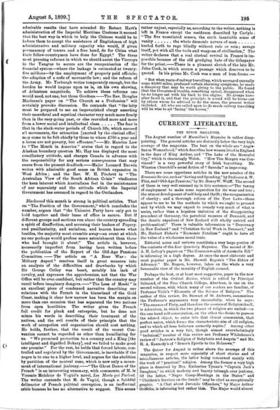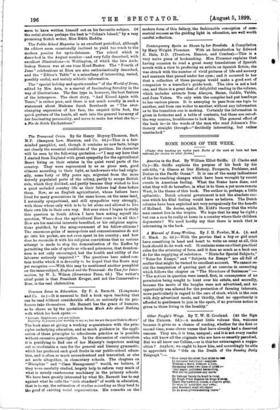CURRENT LITERATURE.
THE MINOR MAGAZINES.
The August number of Macmillan's Magazine is rather disap- pointing. The general articles are distinctly below the very high average of the magazine. The best on the whole are "Anglo- Saxon Womanhood," which describes how women Hied in England in the days of King Arthur, and "The Lake of the Mournful Cry," which is charmingly Welsh. " How Tim Morgan was Con- vinced" is a very powerful story of Irish boycotting. Mr. Winston Churchill's serial fiction of " Savrola'? is improving.
There are some opportune articles in the new number of the Economic Review, such as" Saving and Spending," by Professor A. W. Flux, and1 Old-Age Pensions," by Mr. HenryW. Wolff. The second of these is very well summed up in this sentence:—"The taxing of employment to make some reparation for its' wear and tear ; the utmost development of self-help and thrift ; the reorganisation of charity ; and a thorough reform of the Poor Laws—these appear to me to be the methods by which we ought to proceed and by which we may expect to remedy very much of what is amiss, rather than a hopeless imitation of the disappointing precedent of Germany, the parochial measure of Denmark, and the drastic expedient of New Zealand still wholly untried and problematical." There is valuable information in " Democracy in New Zealand" and "Christian Social Work in Denmark," and Mr. Herbert Fisher's " Economic Fatalism " ought to have all the value of a wholesome moral tonic.
Editorial notes and reviews constitute a very large portion of the contents of the Law Quarterly Magazine. The second of Mr. A. H. Lefroy's papers on "The Commonwealth of Australia Bill" is informiug in a high degree. At once the most elaborate and most popular paper is Mr. Showell Rogers's "The Ethics of Advocacy." Mr. Rogers, however, takes on the whole a very favourable view of the morality of English counsel.
Perhaps the best, or at least most suggestive, paper in the new number of the Critical Review, which is edited by Principal Salmond, of the Free Church College, Aberdeen, is one on the second volume, with which many of our readers are familiar, of Professor Tiele's " Elements of the Science of Religion." The author of this review, Dr. Stewart of St. Andrews, summarises the Professor's arguments very successfully, when he says : " The essence of Piety, and therefore the essence of Religion itself, is Adoration, in which the two phases of religion are united—on the one hand self-consecration, on the other the desire to ppssess the adored object, to enter into that closest communion, that perfect union, which forms the characteristic aim of all religion, and to which all true believers earnestly aspire.',' Among other good articles in a very fair, though almost overwhelmingly "technical," number of this review are Professor Whitehouse's review of `.‘ Jastrow.a Religion of Babylonia and Assyria" and Mr. H. A. Kennedy's of "Bruce's Epistle to the Hebrews."
The Quiver for August is rather above the average of this magazine, in respect more especially of short stories and of miscellaneous articles, the latter being concerned mainly with the work of " practical!' religion. Among the former a very high place is deserved by Mrs. Katharine Tynan's "Captain Jack's Daughter," in which modesty and beauty triumph over jealousy. Of the latter, " Negro Camp-Meetings in the States" and "Children's Services on the Sands '.' may be cited as exceptionally graphic. "A Chat about Juvenile Offenders," by Major Arthur Griffiths, is informing but rather thin. The Major would almost
seem to have written himself out on his favourite subject. Of the serial stories perhaps the best is " Colina's Island," by a very promising Scotch writer, Miss Edith Heddle.
The Public School Magazine is an excellent periodical, although its editors seem occasionally inclined to yield too much to the modern passion for up-to-dateness. The school which is described in the August number—and very fully described, with excellent illustrations—is Wellington, of which the late Arch- bishop Benson was at one time Head-Master. The " Fourth of June" celebrations at Eton are also enthusiastically described, and the "Editor's Table" is a miscellany of interesting, varied, possibly useful, and mainly athletic information.
The " special holiday and sports number " of the World of Dress, edited by Mrs. Aria, is a marvel of fascinating frivolity in the way of illustrations. The fine type is, however, the best feature of the letterpress. The short story, "And Kissed Again with Tears," is rather poor, and there is not much novelty in such a statement about Madame Sarah Bernhardt as " The ever- changing expression of her face, the unquiet little foot, the quick gesture of the hands, all melt into the general harmony of her fascinating personality, and serve to make her what she a Pin-de Made Enchantress."



































 Previous page
Previous page